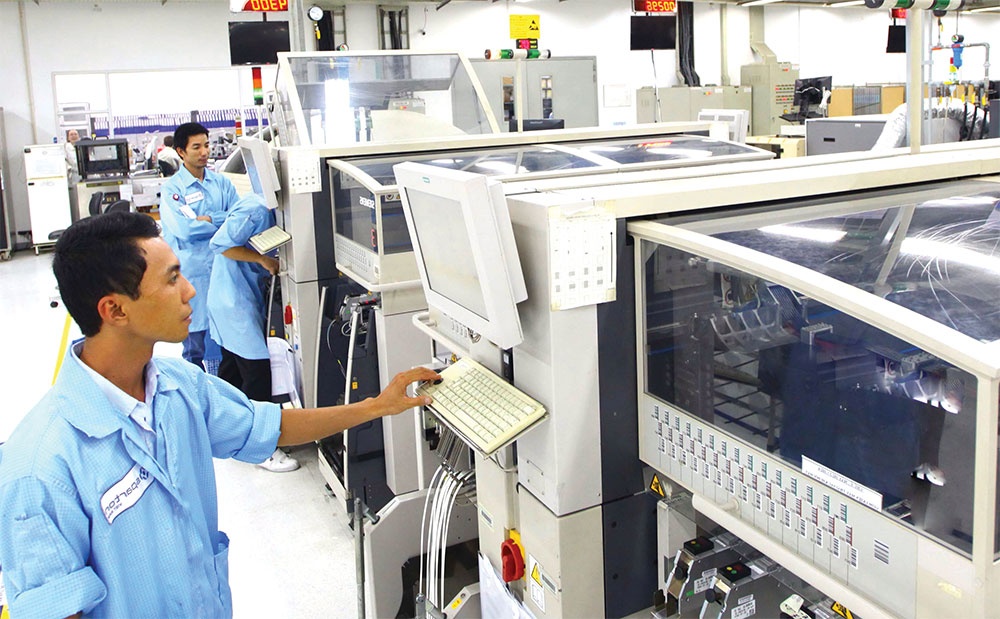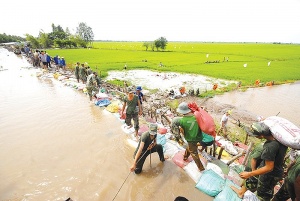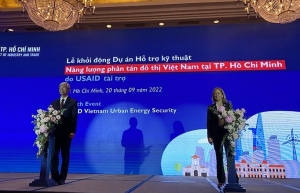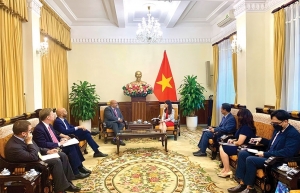US investors display confidence in Vietnam
During her visit to Vietnam last week, Emily Blanchard, chief economist of the US Department of State, said that American companies want to invest in Vietnam to create products with value.
“These are the tools that meet the demand of firms for what they want to be confident when they choose to invest in Vietnam. So again, Vietnam is critically important to US investors,” Blanchard said.
At her meeting with the assistant to the Vietnamese minister of foreign affairs Nguyen Minh Hang, both agreed that Vietnam and the US will work together to discuss bilateral and multilateral mechanisms that can help boost bilateral ties in trade and investment.
“The US Department of State will closely combine with Vietnam to seek more opportunities to expand trade and investment cooperation, with a focus laid on sustainably maintaining production chains, infrastructure development, the energy transition, and digital economy,” Blanchard said.
 |
| New partnerships across tech, the environment, renewables, and more will lift relations further between Vietnam and the United States |
Vietnam and the US have also vowed to expand their relationship in agriculture and foodstuffs.
The US Department of Agriculture (USDA) is cooperating with Thailand’s MM Mega Market to promote over 140 agricultural and foodstuff products at MM Thang Long in Hanoi and MM An Phu in Ho Chi Minh City. The products include assorted vegetables, fruit, beef, chicken, sauces, wine, and other drinks produced by big brand names such as Coca-Cola, Anchor, Budweiser, Heinz, and Kelloggs.
The USDA said that Vietnam’s demand for US products is increasing, and this will help improve trade between both nations.
Fostering trade and investment
According to the American Chamber of Commerce (AmCham) in Hanoi, Vietnam is now on the radar of many US exporters and investors thanks to its big potential including growing demands.
Madhu Kannan, executive vice chair of global corporate and investment banking at Bank of America, told Phan Van Mai, Chairman of Ho Chi Minh City People’s Committee, that the second-largest lender in the US is seeking permission to establish a $50 million branch in Ho Chi Minh City.
Kannan said the bank has 450 world-leading investors in its investment portfolio, and if the branch in Ho Chi Minh City is set up, many of these investors will find it easier in investing in the city. It is expected that Kannan will come to the city for further discussion in the near future.
According to the Ministry of Foreign Affairs, it is expected that from now until the year’s end, authorities from both Vietnam and the US will meet to discuss new mechanisms to increase investment and trade cooperation, which is now witnessing big interest from American investors in the Southeast Asian market.
During Prime Minister Pham Minh Chinh’s visit to the US in May, enterprises from both nations exchanged many cooperation deals and trade contracts worth over $30 billion.
“US companies and investors bring high-quality products and state-of-the-art technologies, services, and business practices to Vietnam,” said AmCham Hanoi’s executive director Adam Sitkoff. “The US business community is optimistic about Vietnam’s prospects for continued strong economic growth in 2022 and beyond, despite global headwinds.
According to Sitkoff, Vietnam’s comprehensive, consistent vaccine rollout and pragmatic reopening positioned Vietnam for a resilient recovery. Its timely adjustment to petroleum prices and pauses on new taxes and fees have helped tamp down inflationary concerns.
According to Vietnam’s General Statistics Office, in the first eight months of 2022, the US was Vietnam’s largest export market, with an estimated turnover of $77.7 billion, up 25.6 per cent as compared to the same period last year.
Accumulatively as of August 20, total US registered investment capital in Vietnam reached over $11 billion for nearly 1,200 valid projects, making the US the 11th biggest foreign investor in Vietnam. From January-August 20, the US’ newly-registered capital in Vietnam was $37.8 million or 9.6 per cent of the latter’s total newly-registered investment.
Vietnam’s potential role as a robust partner was recently made clear by the eye-popping commitment by Vietnamese carmaker VinFast to construct a $4 billion electric vehicle manufacturing campus in North Carolina.
The company plans to employ 7,500 American workers by the year 2027.
Advancing education and energy
Besides cementing trade and investment ties, Vietnam and the US are also working to beef up their education and training and energy cooperation.
Over a week ago, the United States Agency for International Development (USAID) announced that it has signed its first-ever MoU with Vietnam’s Ministry of Education and Training (MoET) to improve the quality of Vietnamese higher education.
“This first-ever MoU between the two marks our ongoing commitment to collaborate on a wide range of higher education partnership programmes that will directly support the MoET’s ambitious higher education reform goals,” said USAID Vietnam mission director Aler Grubbs.
With the fresh move, the USAID will support the MoET with a brand new initiative that will provide direct technical assistance to review and improve higher education policies. Improving policies will advance university autonomy, quality assurance, digital transformation, and innovations in key sectors that are critical to Vietnam’s continued economic growth and development.
The USAID supports Vietnam’s efforts to modernise its higher education system. In partnership with US higher education institutions and the private sector, the USAID is helping Vietnamese universities to improve academic quality and enhance institutional governance to serve as modern models of higher education and drive Vietnam’s socioeconomic development. Many of these programs have connected Vietnamese universities with leading US higher education institutions and private sector companies to develop innovations in teaching and learning, accreditation, curriculum reform, research, and university and industry linkages.
Meanwhile, during his visit to Vietnam two weeks ago, US climate envoy John Kerry and PM Chinh resolved to launch the US-Vietnam Climate Change Working Group by COP27. “The United States is committed to working with G7 countries and others to support an ambitious and just energy transition and climate change adaptation in Vietnam,” Kerry said, adding the US welcomed the efforts of Vietnam’s National Steering Committee for implementing Vietnam’s commitments at COP26, including those to further facilitate more private investment in renewable energy and also transmission.
Kerry shared with PM Chinh the desire of the United States to elevate the bilateral relationship, with cooperation on combating the climate crisis as a pillar of that relationship.
The US also wants to catalyse global support for Vietnam’s energy transition, through technical assistance, and efforts to mobilise public and private investment, including grants and concessional loans. Kerry welcomed Vietnam’s intention to facilitate the connection of complete and nearly-complete renewable energy installations to the country’s grid.
PM Chinh said climate change is a global issue, so a global approach is required. As this issue affects every person, an inclusive approach is necessary.
“Vietnam calls for justice and fairness in the fight against climate change. Vietnam is committed to rapid implementation of the 2050 net-zero emissions pledge through speeding progress toward renewable energy growth and to working closely with international partners including the United States in doing so,” PM Chinh stated.
“Vietnam also calls for concrete international support in wind and solar potential assessment, technology development and transfer, renewable energy and supporting industries development, concessional financing, human resources development, management skills, and enhancing the resilience of vulnerable communities in Vietnam, including the Mekong Delta.”
US chief economist Blanchard also stressed, “The bilateral economic relationship is incredibly important to both Vietnam and the Vietnamese people, and especially to the American people. We are building a global economy where there is greater prosperity, shared by all, greater security and diversity in our supply chains, and increasingly, more sustainable production. As we shift to the energy transition, Vietnam is a vital partner in this work to build a greener economic future.”
| Adam Sitkoff - Executive director, American Chamber of Commerce in Hanoi
Now is a great time for Vietnam to work with the US on bringing modern, efficient infrastructure here to improve Vietnam’s competitiveness. There are many things the government can do right now to make Vietnam more attractive for investment. For example, we need accelerated use of e-government, e-commerce, e-banking, fintech, modern cloud computing, and the overall reduction of paper and cash for all businesses. Accelerated implementation of these digital economy objectives will greatly reduce administrative costs and time burdens for all businesses, and will attract new investors. Another promising area is continuing infrastructure development, especially clean projects. Improving waste management and air quality concerns in Vietnam by accelerating the use of clean energy, clean vehicles, clean agriculture, and reducing the inefficiency and waste of energy, will help build a stronger circular economy and will spur job creation. Today, the United States and Vietnam are close partners and friends – something once thought unimaginable – and American companies and investors are now active in almost every sector of Vietnam’s economy, helping to integrate the country into the global supply chain, creating quality jobs, and making the country more productive, safe and cleaner. It is a credit to the people of both nations that we have been able to move beyond the tragedies of our shared past to build such a strong, vibrant relationship. However, the slowdown in the global economy and shift in consumer preference from purchases of goods to services - especially in the United States - is causing a downturn in consumer demand for “Made in Vietnam” products. It will be important for Vietnam to continue to invest in needed infrastructure to support sustainable growth, diversify its economy to increase the role played by the digital economy and services, and ensure that its workforce remains globally competitive. The American Chamber of Commerce in Vietnam (AmCham) looks forward to partnering with the Vietnamese government to navigate these challenges and improve business conditions that strengthen the private sector, ensure sustainable economic and social development, and promote prosperity here. AmCham appreciated the government’s actions that extended, postponed, and exempted taxes to support businesses and citizens during the pandemic, especially the resolution in January on monetary and fiscal policy which lowered Vietnam’s VAT from 10 to 8 per cent for certain goods and services. While we recognise new taxes and fees may be needed in the future, their impact should be considered carefully to ensure they support business recovery and do not undermine economic growth. For example, a tax increase or expansion, including the special consumption tax, would have a particularly severe impact on companies seriously affected by the pandemic, such as the beverage and hospitality industries. American companies and investors support efforts to create a modern economy that will attract future investment and high-paying jobs for Vietnamese people. For Vietnam to be successful, non-productive red tape must be controlled and the country’s regulatory framework must be stable and predictable. AmCham members remain concerned with changes in policy and regulations which are not consistent with international best practices – frequently seen in the digital economy space, for example. Our members are keen to work with the government and relevant ministries to ensure the regulatory environment supports digital transformation and does not present unnecessary or burdensome requirements that would limit growth in this vital sector. We encourage continuous improvements in infrastructure development – including realistic energy plans – protection of intellectual property, education reform, legal and tax policy certainty, and enhanced transparency in Vietnam. Progress in these areas will not only help attract more foreign investment, but will also will support Vietnam’s aspirations to propel itself to the next sphere of economic competitiveness. We believe the most important factor for a favourable investment climate is a fair, predictable, and streamlined regulatory environment that values innovation - not only to attract new investment, but also to maintain and grow the investment already here. Facilitating prompt approvals of business licenses and investments - including unfreezing real estate development - is key. Greater use of e-government and e-approvals would also be a big step forward. There is no doubt that existing investors expanding operations is the best advertisement to attract new investment. |
 | United States and Vietnam to strengthen ties in climate change adaptation The United States and Vietnam are determined to accelerate the energy transition and enhance cooperation in climate change adaptation. |
 | USAID launches $14 million project to help Ho Chi Minh City accelerate its green growth The United States Mission to Vietnam, through the US Agency for International Development (USAID), and Ho Chi Minh City People’s Committee launched a project to accelerate renewable energy and energy efficiency solutions on September 20. |
 | Building US-Vietnam ties via trade As the United States and Vietnam will approach the 10-year anniversary of the Comprehensive Partnership, it is an exciting time for our bilateral relationship and the United States’ engagement with the broader Southeast Asia region. |
What the stars mean:
★ Poor ★ ★ Promising ★★★ Good ★★★★ Very good ★★★★★ Exceptional
Related Contents
Latest News
More News
- VNPAY and NAPAS deepen cooperation on digital payments (February 11, 2026 | 18:21)
- Vietnam financial markets on the rise amid tailwinds (February 11, 2026 | 11:41)
- New tax incentives to benefit startups and SMEs (February 09, 2026 | 17:27)
- VIFC launches aviation finance hub to tap regional market growth (February 06, 2026 | 13:27)
- Vietnam records solid FDI performance in January (February 05, 2026 | 17:11)
- Manufacturing growth remains solid in early 2026 (February 02, 2026 | 15:28)
- EU and Vietnam elevate relations to a comprehensive strategic partnership (January 29, 2026 | 15:22)
- Vietnam to lead trade growth in ASEAN (January 29, 2026 | 15:08)
- Japanese business outlook in Vietnam turns more optimistic (January 28, 2026 | 09:54)
- Foreign leaders extend congratulations to Party General Secretary To Lam (January 25, 2026 | 10:01)


 Tag:
Tag:




















 Mobile Version
Mobile Version